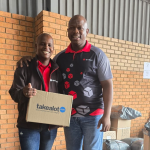It seems the long standing stigma against marijuana and it’s recreational use continue to impede the legalisation of medical cannabis, fuelling people’s prejudices against its healing potential. And, although Zimbabwe just joined Lesotho as the only African countries to legalise it, South Africa still has a long way to go in accepting that this controversial herb might contain solutions to many medical ailments.
According to Hindmarch, cannabinoids, which are a group of chemical compounds found in all living organisms in varying degrees, are the key ingredient in marijuana’s medical uses. These compounds act on the human body’s intracellular cannabinoid receptors to rebuild.
“Cannabinoid are natural to the body,” says Hindmarch. Rather than relying on the many pills doctors prescribe and people grow dependent on, Hindmarch insists that, “you cannot have too much of what is natural to the body.”
Here is how it works:
When undergoing treatment using medical cannabis, a person is usually put under a “three-month protocol” where, through microdosing, the body must first get rid of the toxins and reintroduce the cannabinoids into the system.
And since everyone is different, only the right prescription works, based on one’s medical biography and the type of ailment. This then determines the particular cannabis strain put together for detox. Soon after, drops are introduced to help build the cells and activate the body’s healing capabilities.
“The patient will initially experience one or two days of detox,” Says Hindmarch, when the cannabinoids enter the body and begin fighting toxins. This will be exhibited by feeling under the weather for a few couple of days. When the toxins are out, then the body is ready to self-heal.
Although medical cannabis has been helpful to most — and there is a lot of evidence available that shows it works — the challenge is still the fear of the effects of weed and the stigma that comes with its recreational use.
“You don’t get high from medical cannabis,” says Hindmarch, “Cannabinoids are something we are all born with but comes readily available from the cannabis plant.”
When a person is born, there are certain functions the body is aware of and gets used to, such as eating, sleeping and self-healing. However, when you begin to experience pains and become sick, often times it is the body alerting you that it is not well and needs to heal and rest.
The doctor then prescribes an Aspirin to cure the headache fast. And what the medication does is hijack the body’s healing capacity. Subsequently when you experience pain, the brain wants more Aspirin. The same thing happens when you stub your toe: you take another painkiller. This creates a dependency and you can no longer access your body’s healing capacity. Medication actually makes your body weaker.
Medical cannabis replaces the cannabinoid in the system and searches for damaged cells in the body. And, using the right strain and depending on one’s specific medical condition, the cannabinoids are able to rebuild these cells, as if there was never a disease in the first place.
The different products used, such as sprays, edibles, lotions, and oils, are able to provide relief for treatments for over 500 common illnesses without the users getting ‘stoned’, allowing them to function in their normal everyday lives.
Furthermore, for most people suffering from arthritis, neuropathy, insomnia and chronic pain, they’re able to find relief and also avoid the side effects associated with prescription drugs.
According to Cannabis Oil Research, 20 000 people joined their blog site in a space of two months recently, in order to understand more about how to utilise the healing powers of the cannabis plant. This shows the level of interest that people have with this alternative form of medication and the dissatisfaction they have with pharmaceuticals.
A word of caution, though: It’s not advisable to get Black Oil, a type of cannabis ointment commonly used to treat cancer, from the black market or backstreet, as most people are led to believe. Legalising medical marijuana also affects those who are in dire need for it and resort to desperate measures to find relief. The people who sell it on the streets usually do not know the type of strain they are using for specific illnesses, warns Hindmarch.
It is only matter time until medical cannabis is legalised in South Africa, which will open up a new world of possibilities for people seeking help in treating their ailments through the self-healing potential of the body.
For more information, go to cannabisoilresearch.com DM


















 Become an Insider
Become an Insider